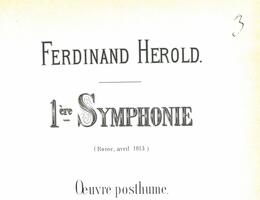Symphony no. 1 in C major
Allegro maestoso – Andante – Minuetto – Rondo : Vivace
In 1812, after his studies at the Paris Conservatoire, Louis-Ferdinand Hérold won the Premier Grand Prix de Rome. The following year, at the Villa Medici in Italy, he began composing his first symphony in C major, intended as an “envoi”—the term for the compositions required by the Institut from the young French Prix de Rome winners during their stay in the Eternal City. The Allegro maestoso, somewhat ceremonial in nature, opens with two arpeggios which firmly establish the work’s key and form a solemn gateway to the symphony. A second deeply tender theme, stated first by the woodwind, is followed by the development, imbued with dramatic tension. This allows Hérold to show off the contrapuntal qualities of a Prix de Rome winner, sometimes—at the risk of interrupting the flow of the discourse—displaying an imitative, rather systematic style of writing. In the Andante, Hérold conforms to the canons of the time without, however, showing any particular inclination for the flights of lyricism that might be expected in this type of movement. The Minuetto is a little reminiscent of certain passages in Haydn’s work, although it does contain a few welcome rhythmic and harmonic surprises (such as the shift of the first section to the major at the last minute), which invigorate the writing. The Trio, in E flat, which is popular in spirit with its countless pedal notes, adds touches of gentle pastoral colour that contrast strongly with the prevailingly austere atmosphere so far. Although the first three parts of the symphony may appear conventional in places, the last movement provides a glimpse of the dramatic qualities that Hérold would reveal in his future stage works. Much more carefully crafted than the rest of the work, this movement sets up feelings of restlessness and suspense which foreshadow the overtures to Zampa and the Pré aux clercs. When the symphony has finished, the listener is left with the strange impression that an opera is about to begin.

